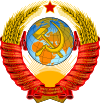
| ||
|---|---|---|
|
Former General Secretary of the CPSU Secretariate (1985–1991)
Presidency (1990–1991)
Foreign policy Post-leadership
Media gallery |
||
The Murmansk Initiative (/mərmænsk ɪˈnɪʃətɪvz/; Russian: Мурманские инициати́вы, Russian pronunciation: [/Мурманские/ ɪnʲɪt͡sᵻɐtʲˈivᵻ][clarification needed]) was a series of wide-range foreign policy proposals concerning the Arctic region made in a speech by the Secretary-General of the Communist Party of the Soviet Union - Mikhail Gorbachev - on October 1, 1987 in Murmansk, Soviet Union, considered to be a trademark of his foreign policy.[1]
The initiative tied together economic, environmental, and security issues in the Arctic.[2] Gorbachev's aim was to transform the Arctic Circle from being a military theater to an international zone of peace among the Arctic powers. The initiative was launched as an invitation for disarmament of nuclear weapons and establishment of an East-West dialogue around the Arctic.[3]
The Murmansk speech's goals paralleled Gorbachev's ambitions in previous speeches, like the one in Vladivostok (July, 1986) dealing with Asia-Pacific relations and a later speech in Belgrade (March, 1988) dealing with problems pertaining to security in the Mediterranean Region.[4]
The Murmansk Initiative was considered a major turning point in the Arctic policy of the Soviet Union (USSR) and represented the application of Gorbachev's "new political thinking" in Northern Europe.[2] It helped guide the foreign policy of the newly-formed Russian government in the Arctic after the dissolution of the Soviet Union in 1991.
- ^ Purver, Ronald (1988). "Arctic Security: The Murmansk Initiative and its Impact". Current Research on Peace and Violence. 11 (4): 147–158. JSTOR 40725103.
- ^ a b Janes, Robert W. (1990). "The Soviet Union and Northern Europe: New Thinking and Old Security Constraints". Annals of the American Academy of Political and Social Science. 512 (1): 167. doi:10.1177/0002716290512001015. ISSN 0002-7162. S2CID 145013370.
- ^ Åtland, Kristian (2008). "Mikhail Gorbachev, the Murmansk Initiative, and the Desecuritization of Interstate Relations in the Arctic". Cooperation and Conflict. 43 (3): 290. doi:10.1177/0010836708092838. ISSN 0010-8367. S2CID 153819245.
- ^ Åtland (2008), p. 293.

